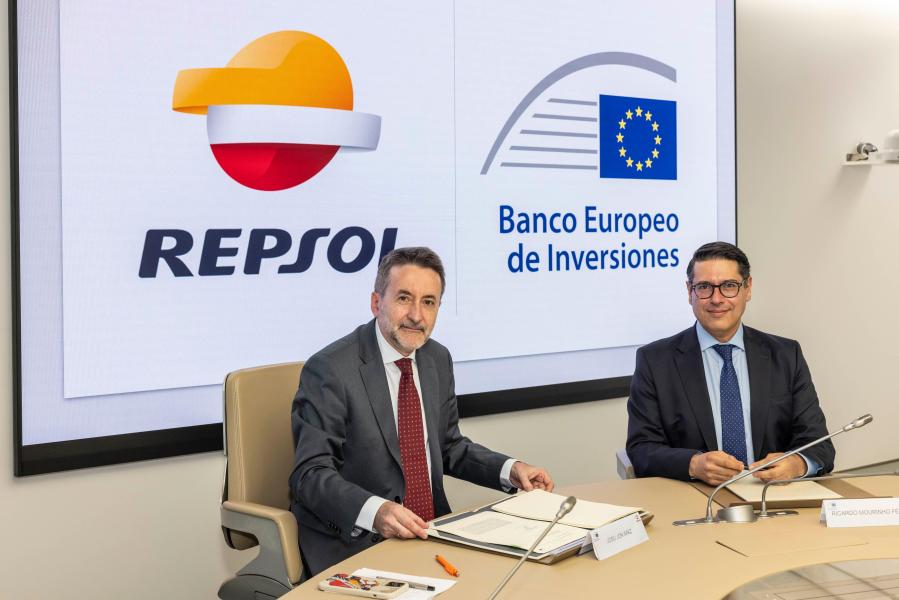
- The financing signed today amounts to €400 million and is the first tranche of the total approved loan, which will support the rollout of wind and solar power plants with a total capacity of 1.1 GW.
- The operation contributes to the REPowerEU objective of increasing security of energy supply by reducing EU dependency on imports of fossil fuels.
- The agreement will also support Repsol's goal of reaching 20 GW of installed renewable energy capacity by 2030 and zero net emissions by 2050.
The European Investment Bank (EIB) has approved a €575 million loan to support Repsol’s rollout of wind and solar photovoltaic plants in Spain with a total capacity of 1.1 GW. The renewable energy facilities will be operational before the end of 2025.
The projects developed will generate electricity equivalent to the annual average consumption of around 645 000 Spanish households and will help reduce annual greenhouse gas emissions by the equivalent of over 800 000 tonnes of CO2 per year. Over 35% of the installed capacity will be in cohesion regions, where per capita income is less than 75% of the EU average, underlining the EIB’s commitment to economic and social cohesion.
The €400 million financing signed today — the first tranche of an approved EIB loan of €575 million — will contribute to accelerating the energy transition, strengthen the security of power supply, and boost climate action and social and economic cohesion. The loan is part of the EIB’s dedicated contribution to REPowerEU, and will support energy security by lowering EU dependency on fossil fuel imports.
“With this operation, the EIB is continuing to accelerate the energy transition in Spain by increasing renewable energy generation capacity and supporting Repsol's decarbonisation strategy,” said EIB Vice-President Ricardo Mourinho Félix during the signing event held in Madrid. “This is a critical moment, particularly due to the impact of Russia's unjustified aggression against Ukraine. Guaranteeing access to sustainable energy for all Europeans is essential for the strategic autonomy of the European Union. Public-private partnerships and the firm commitment of companies to decarbonisation are more necessary today than ever.”
Repsol CEO Josu Jon Imaz said: “This new financing supports the company's roadmap set out in the 2021-2025 Strategic Plan, aiming to reach 6 GW of installed capacity by 2025 and 20 GW by 2030. The EIB's support endorses our goal of net zero emissions by 2050 and is further proof that we are moving in the right direction.”
EIB and Repsol cooperation and net zero emissions target
This operation is not the first time that the EU bank has supported Repsol's decarbonisation strategy, with a €120 million loan signed last December for the construction and operation of the first advanced biofuels production plant in Spain, located in Cartagena (region of Murcia).
Repsol already has a global portfolio of 1.9 GW of renewable energy projects in operation, most of which are in Spain. In addition, the company has renewable assets in different stages of development in the United States, Chile, Portugal and Italy.
Repsol was the first company in its sector to commit to achieving net zero emissions by 2050, and is implementing an ambitious decarbonisation strategy, in line with the goals set out in the Paris Agreement and the United Nations Sustainable Development Goals. The company's roadmap includes Carbon Intensity Indicator reduction targets of 15% by 2025, 28% by 2030, and 55% by 2040.
The EIB and energy security
In 2022, the EIB Group committed financing of more than €17 billion for the energy transition in Europe. Projects in Spain received a record €3.1 billion in financing commitments for sustainable energy and natural resources in the same year, making it the second largest beneficiary in the European Union. These figures confirm the EU bank’s commitment to ensuring access to sustainable energy at a time of great uncertainty. Our investments are helping Europe weather the crisis triggered by the abrupt cut in gas supplies in the aftermath of Russia’s unjustified attack against Ukraine.
In July 2023, the EIB Board of Directors decided to raise the additional funds earmarked for projects aligned with REPowerEU, the plan designed to end Europe’s dependence on fossil fuel imports, to €45 billion. The additional funding comes on top of the EIB’s already substantial support for clean investments and represents a 50% increase compared to the original €30 billion package announced in October 2022.
The EIB board also decided to broaden the scope of eligible sectors to boost financing for EU manufacturing in state-of-the-art strategic net-zero technologies and the extraction, processing, and recycling of critical raw materials. The additional funding will be deployed by 2027 and, in total, is expected to mobilise more than €150 billion in investment for the targeted sectors.
Find out more about the EIB’s support for the energy sector here.
Background information
The European Investment Bank Group (EIB Group) — which consists of the EIB and the European Investment Fund (EIF) — signed €9.9 billion in new financing last year in Spain, with record support for climate action and environmental sustainability projects.
Repsol
Repsol is a global multi-energy company that leads the energy transition and has set itself the goal of being zero net emissions by 2050. It is present throughout the energy value chain, employs 24 000 people, distributes its products in more than 90 countries and has 24 million customers. To achieve net zero emissions by 2050, Repsol is committed to a model that integrates all technologies for decarbonisation, based on improving efficiency, increasing its renewable electricity generation capacity, producing renewable fuels, developing of new solutions for customers, the circular economy, and the promotion of cutting-edge projects to reduce the carbon footprint of the industry.

